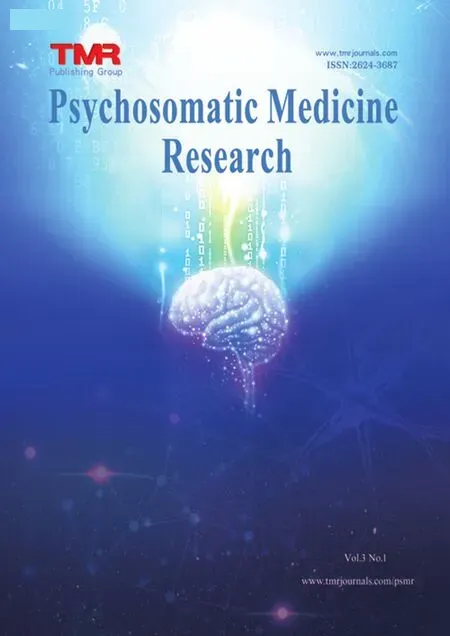Evidence Based Medicine in Psychosomatics:Prospects and Challenges
Yi-Bo Wu,Lin-Lin Zhang
1Peking University School of Public Health,Beijing,100191,China.2Department of Social Science and Humanities of Harbin Medical University,150081,China.
Keywords:Evidence-based Medicine,Psychosomatic medicine,Evidence-based practice
Evidence-based Medicine (EBM) means "Medicine based on scientific Evidence" [1].Its core idea is that medical staff should use the latest and best scientific Evidence obtained in clinical research prudently,clearly and wisely.It also combine the professional skills and clinical experience of doctors,take into account individual values and expectations of patients and combine the three perfectly to formulate the best treatment measures for each patient[2].
As an emerging discipline,Psychosomatic medicine mainly discusses the relationship between the heart(psycho-psychological,social,ethical,etc.) and the body (the structure and function of the body),and its role in the maintenance of health and the occurrence,development and rehabilitation of diseases[3].Psychosomatic medicine,in its narrow sense,mainly studies the etiology,pathology,clinical manifestations,diagnosis,treatment and prevention of psychosomatic diseases.Psychosomatic medicine in a broad sense is to study all psychosomatic phenomena in the struggle between human beings and diseases,exploring the interdependent relationship between body and mental,physiological and psychological phenomena.Modern psychosomatic medicine puts more emphasis on the role of social environment and psychological factors in maintaining health and preventing the development of diseases and its significance in guiding the treatment and prevention of diseases.
Evidence-based practice has developed rapidly in many fields,such as medicine,psychology,education,social work and public policy making[4].Psychosomatic medicine,as a branch of medical science,is closely combined with clinical practice,which requires more evidence-based principles in practice:First,in clinical practice,diagnosis and treatment of patients with psychosomatic disorders should be based on objective scientific results as evidence.Second,evidence is rigorously evaluated by combining clinician expertise with the best results obtained from current systematic studies.Finally,the best evidence is used for optimal decision-making,and the best evidence is applied to clinical practice.Only with strong evidence support can we ensure the reliability of the results and better guide clinical practice[5].
At present,the industry and the whole society have gradually realized the importance of the combination of psychosomatic medicine and evidence-based medicine,emphasizing that psychosomatic medical decision-making should be based on the best scientific research evidence,so as to further deepen the research in the field of psychosomatic medicine.Therefore,in order to help solve the existing problems of psychosomatic disorders and enrich the theory of psychosomatic medicine,The journal Psychosomatic Medicine Research publishes a special issue on the theme "Evidence Based Medicine in Psychosomatics".This special issue collects 8 studies from China,the United States and the United Kingdom.The content covers media use and physical dissatisfaction,the traditional Chinese medicine and pharmacy service model during the COVID-19 period,acupuncture and moxibustion for psychosomatic tinnitus,traditional Chinese medicine for asthenospermia,scale design for children with nephrotic syndrome,etc.It is believed that it can provide readers with rich academic feast.In addition,we call on the majority of scholars to jointly carry out multi-center evidence-based research on psychosomatic medicine,so as to lay a solid theoretical foundation for psychosomatic medicine to truly establish itself in the discipline.
 Psychosomatic Medicine Resesrch2021年3期
Psychosomatic Medicine Resesrch2021年3期
- Psychosomatic Medicine Resesrch的其它文章
- Discussion on Treatment of Asthenospermia from the Perspective of Psychosomatic Medicine of Traditional Chinese Medicine
- Psychosomatic Medicine and Evidence-Based Surgery:Reflections and Perspectives
- A Commentary of a Psychological Experience Questionnaire for Screening Non-Psychiatric Inpatients for Violence-Related Mental Health Disorders
- A Case Report:Traditional Chinese Medicine for Curing Psychosomatic Tinnitus Symptoms
- Impacts of Social Media Use on Body Dissatisfaction Among Female College Students in China
- Development of Medication Literacy Scale for Pediatric Population with Nephrotic Syndrome and Assessment on Reliability and Validity
